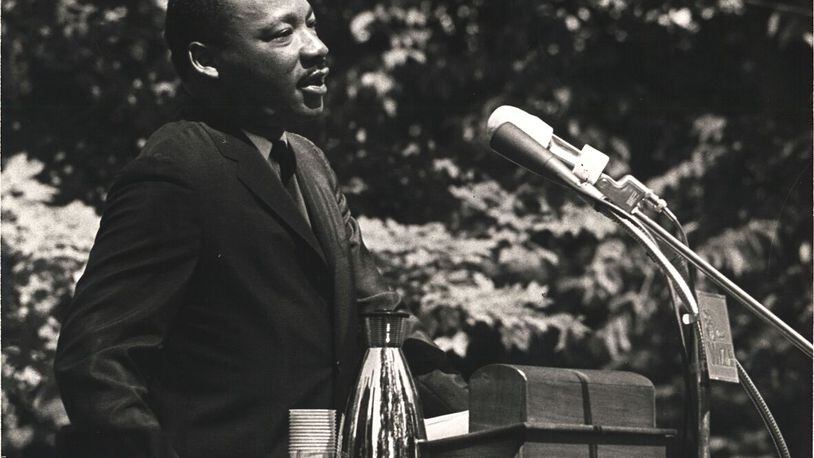He spoke at Central State University’s 1958 commencement
"It's a great time to be alive," Dr. King told the 172 graduates gathered at Central State University's commencement in 1958. "You are graduating at the time of the dying of an old world and the birth of a new one."
He made a speech at the University of Dayton fieldhouse
Just weeks after being awarded the Nobel Peace Prize and months after Congress passed the Civil Rights Act of 1964, Dr. King made a speech at the University of Dayton fieldhouse. More than a dozen protesters from the National States Rights party paraded outside with signs condemning the Civil Rights Act and charging King with association with the Communist party.
He was given a key to the city of Dayton
City Commissioner Don L. Crawford presented Dr. King with a key to the city on arrival and told him, “In this city there are some doors neither this key nor my persuasion can open to you.”
He spoke at Wilberforce University’s 107th commencement
In an address to graduates at Wilberforce University's 107th commencement on June 9, 1965, Dr. King "called on the graduates to battle three evils — racial injustice, poverty and war," according to a story in the next morning's Dayton Daily News. "Racial injustice is still the Negroes' burden and America's shame."
He spoke at Antioch College's 113th commencement
Credit: Photo courtesy Antiochiana Antioch College
Credit: Photo courtesy Antiochiana Antioch College
Dr. King addressed 296 graduates at the 113th commencement at Antioch College in Yellow Springs. He was accompanied by his wife, Coretta Scott King, a former Antioch student. Of Antioch, King said, “All men of good will are indebted to this institution for its heritage. I am indebted to Antioch for having given me a marvelous wife.” Unbeknownst that day, Dr. King had been targeted for an assassination attempt during the visit to Antioch.
He was targeted for an assassination attempt while at Antioch
Credit: Photo courtesy Antiochiana Antioch College
Credit: Photo courtesy Antiochiana Antioch College
19-year-old Daniel Wagner from Baltimore testified to the House Un-American Activities Committee in Washington, D.C. in Feb. 1966 that he had been part of plot to kill Dr. King with a Savage rifle purchased from Eloise Witte of Cincinnati. Wagner told the committee that Witte was to furnish 10 additional men who would fire into the crowd at the outdoor commencement while he would shoot Dr. King, according to a story published in the Dayton Daily News on Feb. 11, 1966. Witte, however, cancelled the assassination plot a few days before Antioch’s commencement because she couldn’t “get organized for that because of her work at the same time for a rally of the Ku Klux Klan near South Lebanon,” the Dayton Daily News reported on Feb. 11, 1966.
About the Author
